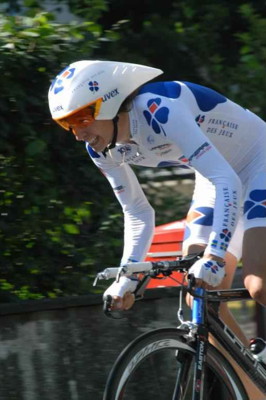
|
| Thomas Lökvist (© Hein Zwicky) |
Read also - 2007: Still looking back in anger - Part 1
Read also - 2007: Still looking back in anger - Part 2
Looking back in anger?
We could repeat last years editorial review of the year but we decided not to. If you would like to read it, its here.
Cycling needs a new start and the development of a bloodpass and a steroid profile are steps in the right direction.
We don't need the ethical code or the riders agreement of a new cycling which actually was a cheap pr move. In a legal
sense the agreement wasn't woth the paper it has been written on. For the long term the sport needs a doping prevention
programm, which should be brought into schools, clubs and the media. We need a change of attitude. On the repression side
it isn't enough to ban riders, it has been done for more then 30 years now and it didn't change anything. Riders receive their
ban and they are replaced by other riders and after that comes business as usual. The teams who are involved have to be punished
as well. The last two years showed that the national federations are handling doping cases very different. It shows that we
need an international body that will handle doping cases to prevent situations where riders who are allegedly involved in
a doping case like the 'Operacion Puerto' are treated differently for the same offense in the same doping case. It can't be
that Ivan Basso, Michele Scarponi and others are banned while other riders can continue racing as if nothing has
happened.
An underestimated problem is the weak financial structure of professional cycling. The teams can't generate revenues
by ticket sales like professional football (soccer) clubs can. A team which depends on one main (title) sponsor and a few
co-sponsors does not only have to win from a sportive perspective but also to satisfy their main sponsor and to be attractive
for possible sponsors in the future. They have to win to stay in the peloton, to make sure that the team still exist in the
next season. Teams, race organisers, national- and international governing bodies need to find new ways to generate revenues.
Teams shouldn't have to pay large amounts of money for a Pro-Tour licens, they should become a fair share of the renevues
from tv rights. But they also need to do more to generate additional revenues. Toyota-United has an interesting business model which might not fit for every team but team owner Sean P. Tucker did think out of the box. There are much more possibilities
to generate revenues from merchandising, fan programms with paying memebers who will receive exclusive goodies, the hospitality
programms of most teams could generate more income for the teams if handled more professional and teams could create their
own invitationals during the winter time where they could sell tickets and tv rights. There are a lot more possibilities as
that are being used at the moment. The ideas we mentioned are not thinked out, they are little brain storms to show that with
a little more creative thinking the teams could be more independent from their title sponsor. That would be another major
step in the fight against doping.
Cyclingheroes
There will be some changes at the Cyclingheroes site in 2008. From February Saul Raisin will publish a regular blog on our website. We will aslo publish more riders diaries, starting at January 5 with Malaya van Ruitenbeek of the Kuota-Senges team at the Vuelta Al Tachira (Venezuela). We want to bring more coverage of races outside Europe in the
future. We will have riders diaries and race coverage from US, Asian, African and European races. We hope that professional
cycling will overcome the current crisis and call on all parties involved to do everything they can to create a season
full of great races, not scandals.
We wish all readers a Happy New Year!
Related stories
Other stories
|

